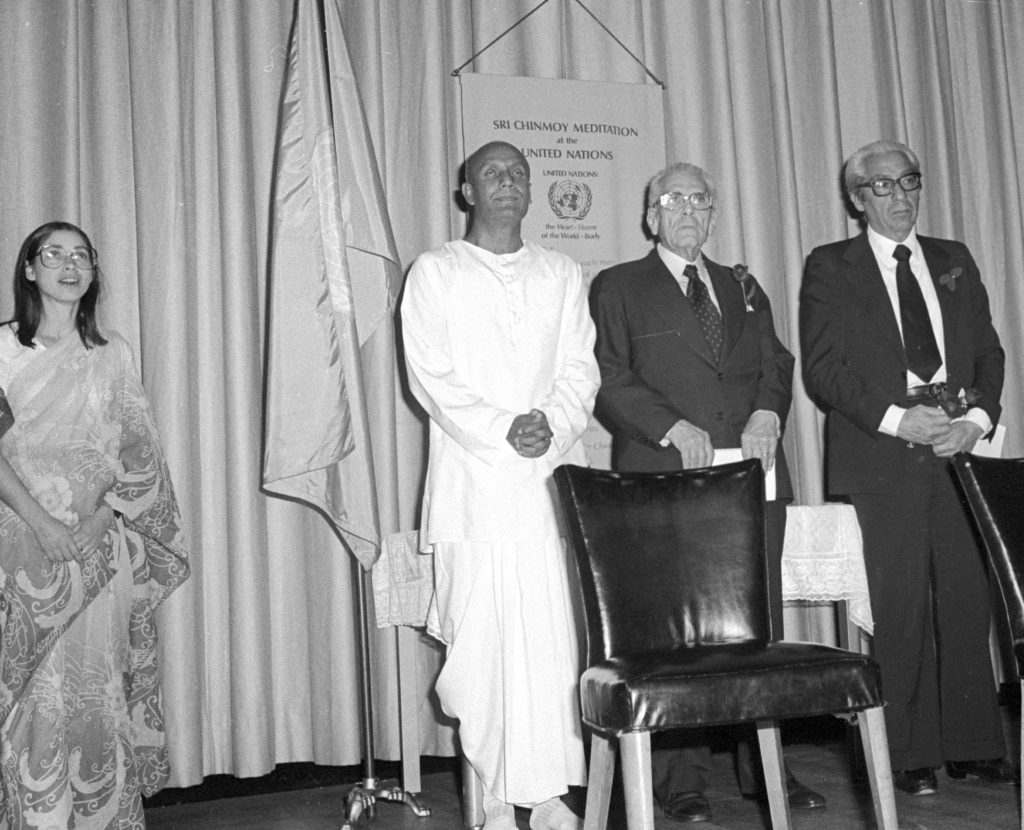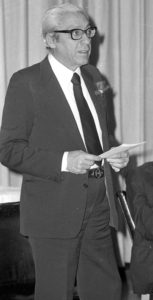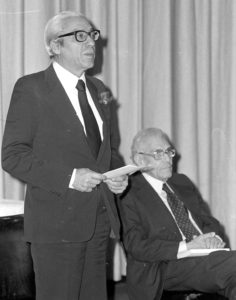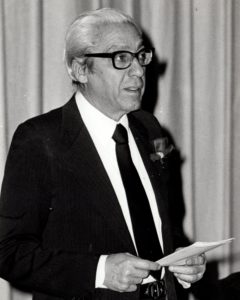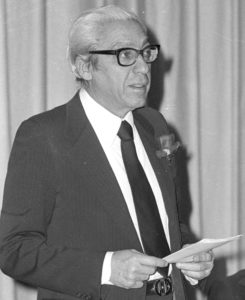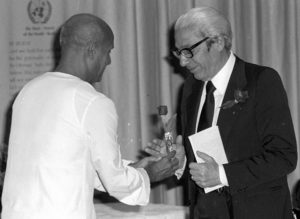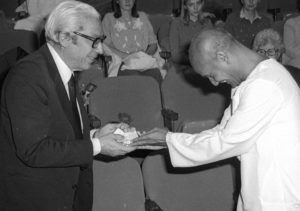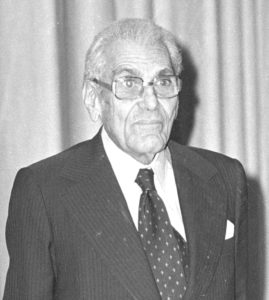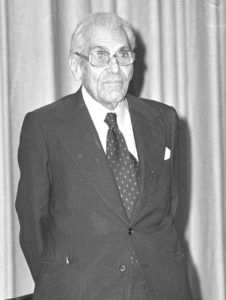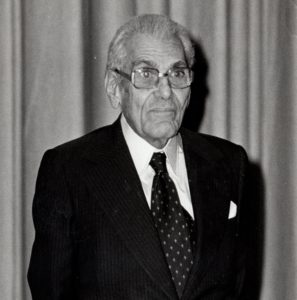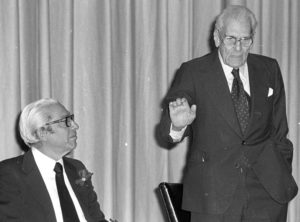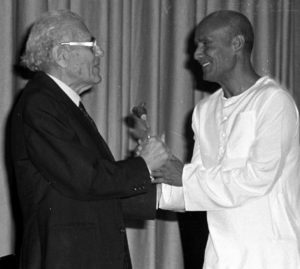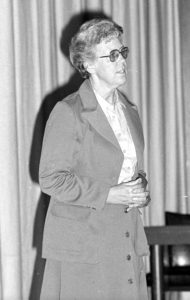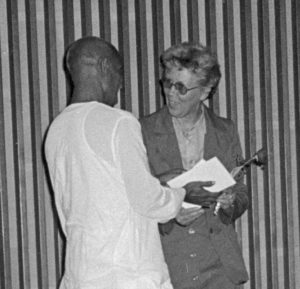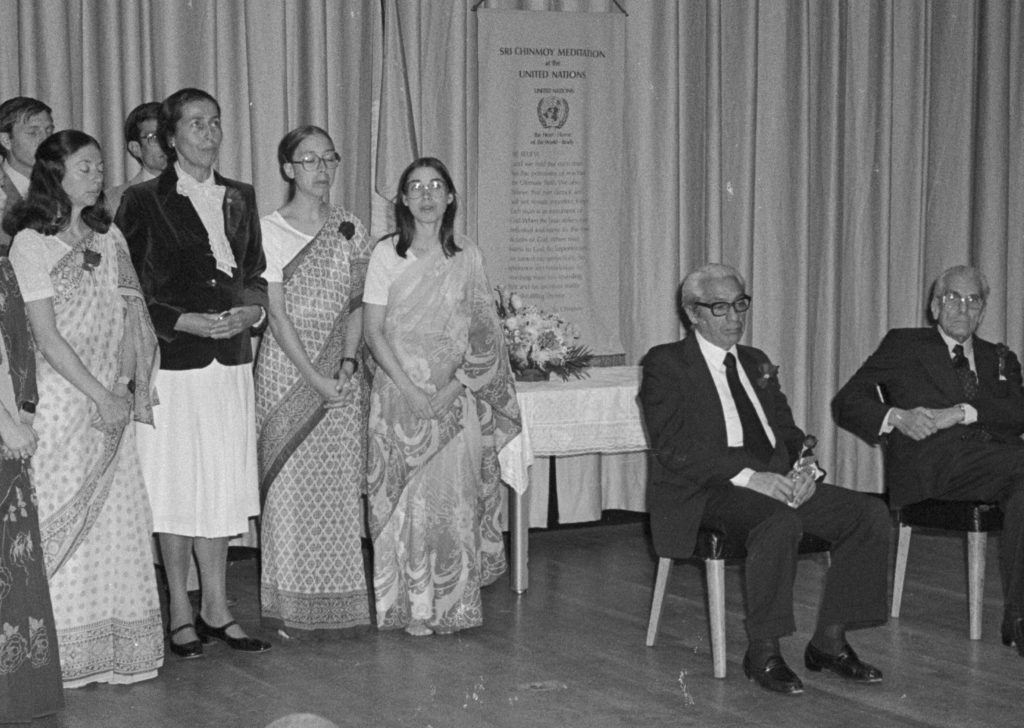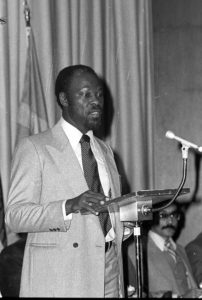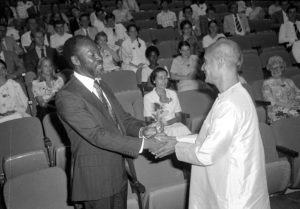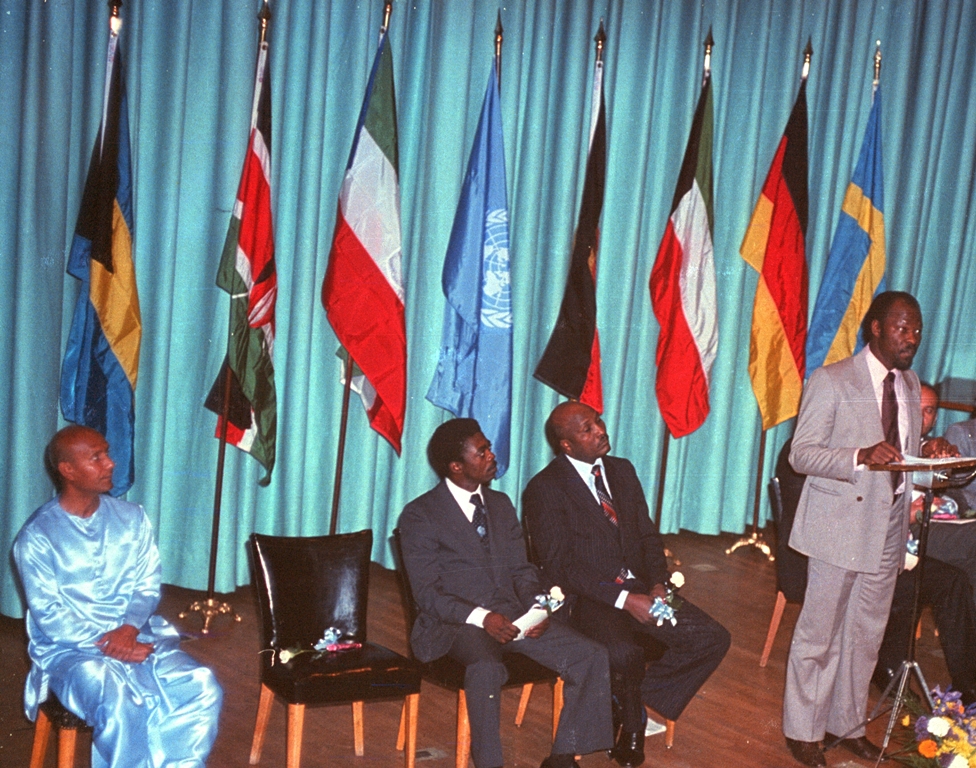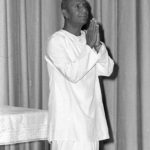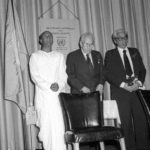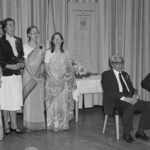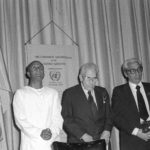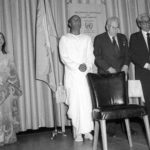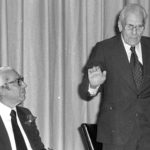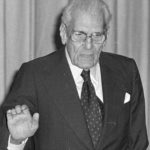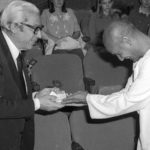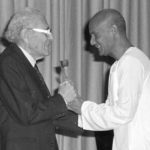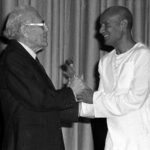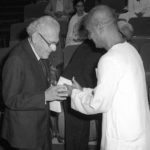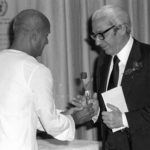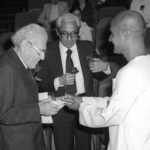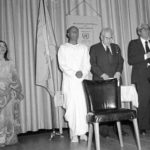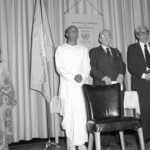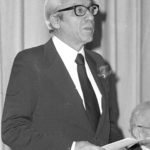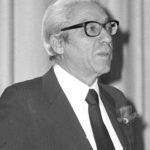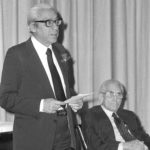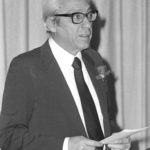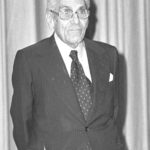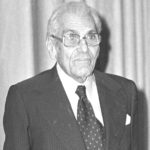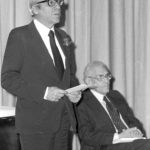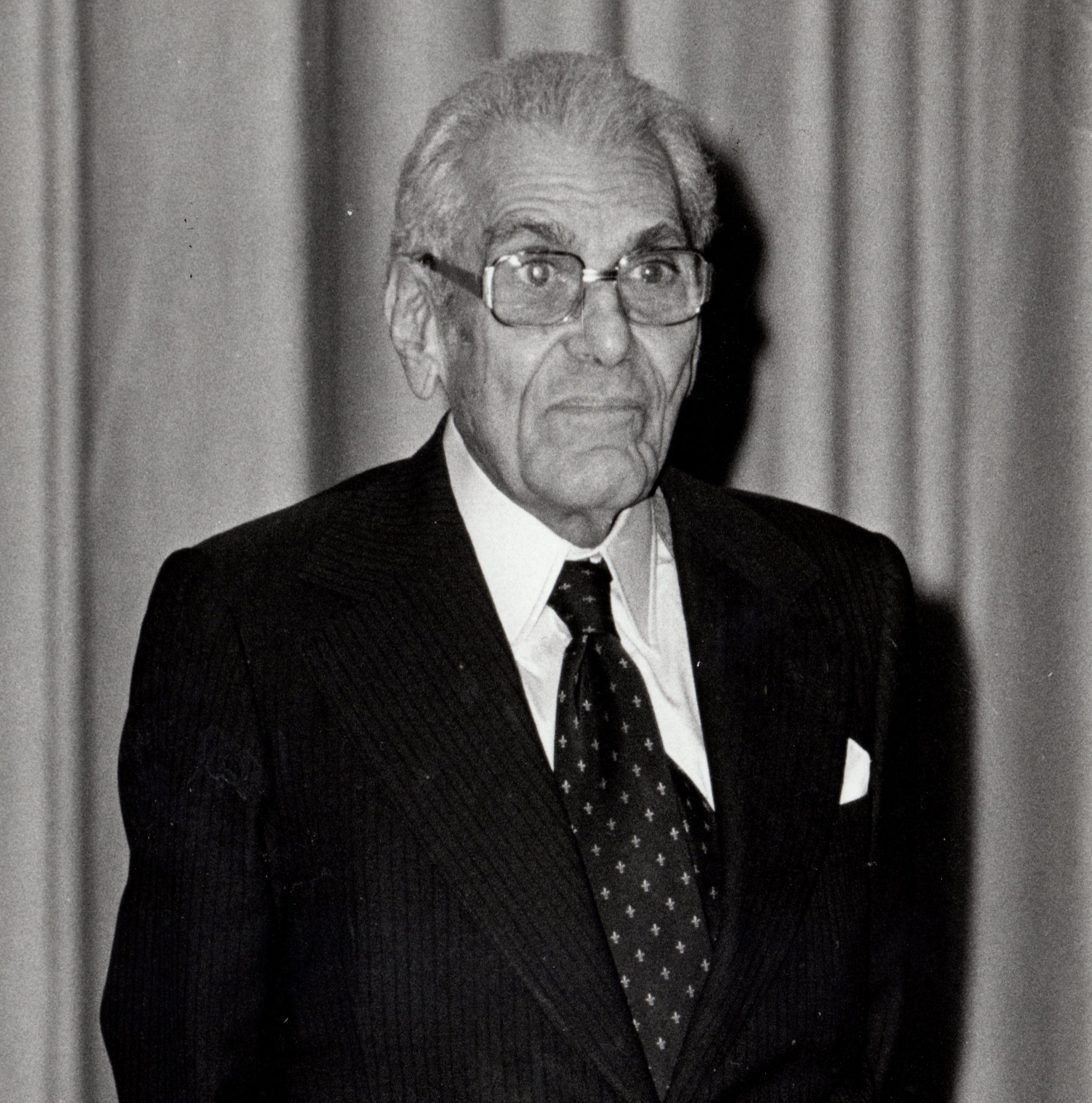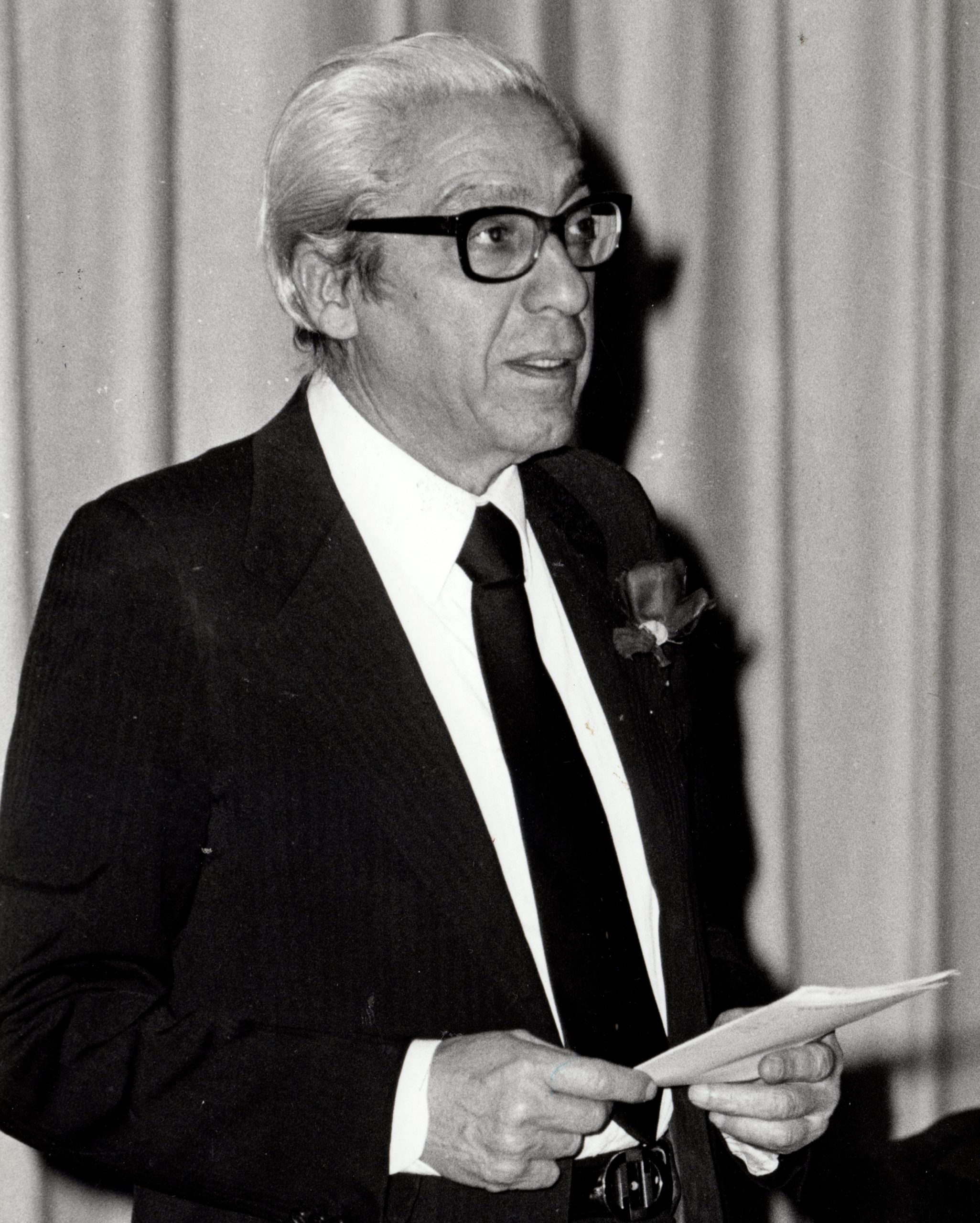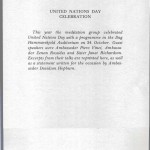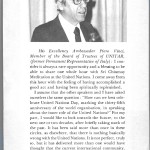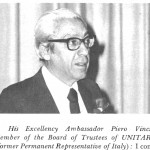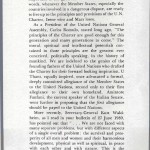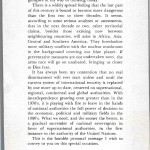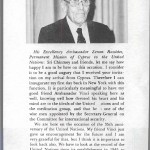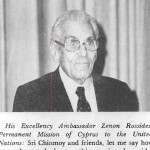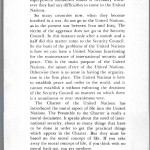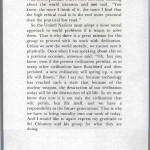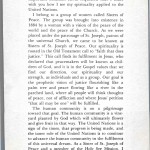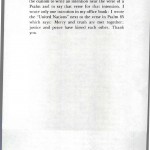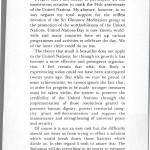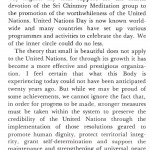UN Day Celebration 24th Oct 1980
Filed under UN AnniversariesThis year the Peace meditation group celebrated United Nations Day with a programme in the Dag Hammarskjold Auditorium on 24 October.
Guest speakers were Ambassador Piero Vinci, Ambassador Zenon Rossides and Sister Janet Richardson.
Excerpts from their talks are reprinted here, as well as a statement written for the occasion by Ambassador Davidson Hepburn.
His Excellency Ambassador Piero Vinci, Member of the Board of Trustees of UNITAR, (former Permanent Representative of Italy).
I consider it always a rare opportunity and a blessing to be able to share one whole hour with Sri Chinmoy Meditation at the United Nations. I come away from this hour with the feeling of having accomplished a good act and having been spiritually replenished. I assume that the other speakers and I have asked ourselves the same question : “How can we best celebrate United Nations Day, marking the thirty-fifth anniversary of the world organisation, in speaking about the inner role of the United Nations?”
For my part, I would like to look towards the future, to the next one or two decades, after briefly taking stock of the past. It has been said more than once in these circles, as elsewhere, that there is nothing basically wrong with the United Nations.
It is not perfect, truly so, but it has delivered more than one would have thought that the current international community, the Member States and the imperfection of human nature in general would have empowered it to. Despite its many shortcomings and failures, it has several times over the years been the main instrument in saving the world from a catastrophe.
You may call the United Nations a face-saving device or what ever else you like, but it does not matter. What is important is the goodness of the results. In other words, whenever the Member States, especially the countries involved in a dangerous dispute, are ready to live up to the principles and provisions of the U.N. Charter, Irene wins and Mars loses*
(*note: . Irene was the ancient Greek goddess of peace and the season of spring. Mars . In ancient Roman religion and myth, was the god of war and also an agricultural guardian)
As a President of the United Nations General Assembly, Carlos Romulo, stated long ago, “The principles of the Charter are good enough for this generation and many generations to come. ” The moral, spiritual and intellectual potentials contained in those principles are the greatest ever conceived, politically speaking, in the history of mankind. We are indebted to the genius of the founding fathers of the United Nations who drafted the Charter for their forward-looking inspiration. U Thant, equally inspired, once advocated a formal, deeply committed allegiance of the Member States to the United Nations, second only to their first allegiance to their own homeland. Amintore Fanfani, the current speaker of the Italian Senate, went further in proposing that the first allegiance should be payed to the United Nations.
More recently, Secretary-General Kurt Waldheim, as I read in your bulletin of 27 June 1980, has pointed out that
“… We are not faced with many separate problems, but with different aspects of a single overall problem: the survival and prosperity of all men and women and their harmonious development, physical as well as spiritual, in peace with each other and with nature. This is the solution we must seek. It is within our power to find it.”
Following the same approach, I personally drafted, more than one year ago, a working paper on a new philosophy on disarmament. On the basis of that paper I would like to give you a few glimpses of my way of thinking today. There is a widely spread feeling that the last part of this century is bound to become more dangerous than the first two or three decades. It seems, according to some serious analyses or assessments, that in the next decade or two, other territorial claims, besides those existing now between neighbouring countries, will arise in Africa, Asia, Central and Southern America.
They foreshadow more military conflicts with the nuclear mushroom in the background covering our blue planet. If preventative measures are not undertaken soon, the a rm s race will go on unabated, bringing us closer to Dies Irae*.
(* Note: Dies Irae “Day of Wrath” ; a medieval Latin hymn about Judgment Day, beginning Dies Irae: it was formerly sung at the mass for the dead. : “the Day of Judgment” sung in requiem masses.)
It has always been my contention that no real disarmament will ever start unless and until the current system of international security is replaced by one more up-to date, centered on supernational, regional, continental and global authorities. With interdependence growing even greater than in the 1970’s, it is playing with fire to leave in the hands of national authorities the full power of decision in the economic, political and military fields in the 1980 ‘s. What we need, and the sooner the better, is a gradual surrender of national sovereignty in favor of supernational authorities, in the first instance to the authority of the United Nations. This is the humble personal message I wish to convey to you on this special occasion.
His Excellency Ambassador Zenon Rossides, Permanent Mission of Cyprus to the United Nations:
Sri Chinmoy and friends, let me say how happy I am to be here on this occasion. I consider it to be a good augury that I received your invitation on my arrival from Cyprus. Therefore, I can inaugurate my first day back in New York with this function. It is particularly meaningful to have my good friend Ambassador Vinci speaking here as well, knowing well how devoted his heart and his mind are to the ideals of the United Nations and of the meditation group, and that he is one of the wise men appointed by the Secretary-General on the Committee for international security.
We are here on the occasion of the 35th anniversary of the United Nations. My friend Vinci just gave us encouragement for the future and I am very grateful for that, but I think it is important to look back also. We have to look a t the record of the United Nations since its establishment in 1945 to the present. I will put it this way. It has now become apparent to everyone that the United Nations is indispensable for the functioning of our world. It was not realised before because we saw so many wars carried out without any regard for the United Nations, without the subject ever going to the United Nations. But gradually we saw that the super powers themselves found it necessary whenever they had any difficulties to come to the United Nations.
So many countries now, when they become involved in a war, do not go to the United Nations, as in the present war between Iran and Iraq. The victim of the aggressor does not go to the Security Council. In this instance only after a month and a half did this matter come to the Security Council. So the basis of the problems of the United Nations is how we can have a United Nations functioning for the maintenance of international security and peace. This is the main purpose of the United Nations, the raison d’etre of the United Nations. Otherwise there is no sense in having the organization in the first place.
The United Nations is here to establish peace and order in the world, and it cannot establish it without enforcing the decisions of the Security Council on matters on which there is a unanimous or near unanimous vote. The Charter of the United Nations has introduced the moral aspect of life into the United Nations. The Preamble to the Charter is really a moral document. It speaks about the need of international security, about so many things that have to be done in order to get the practical things which appear in the Charter. But they must be based on the moral concept of life. If you take away the moral concept of life, if you think with no moral back-up, you get nowhere. The United Nations has two aspects, the moral aspect and the practical aspect. The moral aspect is promoted by the Sri Chinmoy Peace Meditation. That is why the work of this meditation group is more important even than what is done in a practical way in the United Nations itself.
This concept was brought out in a cartoon I read yesterday in the Wall Street Journal.
There were two men thinking about the world situation and one said, “You know, the more I think of it, the more I find that the high ethical road is in the end more practical than the practical low road.”
So the United Nations must adopt a more moral approach to world problems if it wants to solve them. That is why there is a
great mission for this group to proceed with its work with dedication. Unless we save the world morally, we cannot save it physically. Once when I was speaking about this on a previous occasion, someone said, “Oh, but you know, even if the present civilisation perishes, as so many other civilisations have flourished and then perished, a new civilisation will spring up, a new life will flower ” But I say no, because technology has reached such a state that because of the nuclear weapon, the destruction of our civilisation today will be the destruction of all life. So we must know that now it is not only the civilisation that will perish, but life itself, and we have a responsibility to the future generations. That is why we have to bring morality into our work of today. And I would like to again express my gratitude to Sri Chinmoy and his group for what they are doing.
Sister Janet Richardson, Permanent Observer Mission of the Holy See to the United Nations:
Archbishop Cheli has asked me to bring you the greetings of all the members of our Mission on this important occasion. Kevin requested that I share with you how I see my spirituality applied to the United Nations.
I belong to a group of women called Sisters of Peace. The group was brought into existence in 1884 by a woman with a vision of the peace of the world and the peace of the Church. As we were placed under the patronage of St. Joseph, patron of the universal Church, we came to be known as Sisters of St. Joseph of Peace.
Our spirituality is rooted in the Old Testament call to “faith that does justice.” This call finds its fulfilment in Jesus, who declared that peacemakers will be known as children of God, and it is in the Gospel values that we find our direction, our spirituality and our strength, as individuals and as a group. Our goal is the prophetic vision of justice flourishing like a palm tree and peace flowing like a river in the parched land, where all people will think thoughts of peace, not of affliction and where Jesus’ petition “that all may be one” will be fulfilled.
The human community is on a pilgrimage toward that goal. The human community is a vineyard planted by God which will ultimately flower and give fruit in that way. The United Nations is a sign of the times, that progress is being made, and the inner role of the United Nations is to continue to advance the human community to the fulfilment of this universal dream.
As a Sister of St. Joseph of Peace and a member of the Holy See Mission, I participate in the life of this community, collaborating in the efforts to set a “peace mosaic” in place.
Today in one of our Sisters’ residences, forty Sisters are gathered for an hour of prayer for the United Nations. Many of our Sisters have pledged special daily prayer for this intention.
When I was beginning my training in the congregation, it was the custom to write an intention near the verse of a Psalm and to say that verse for that intention. I wrote only one intention in my office book :
I wrote the “United Nations” next to the verse in Psalm 85 which says: Mercy and truth are met together; justice and peace have kissed each other.
Thank you.
Photos of Sister Janet at earlier Peace Meditation events:
The Peace Meditation Choir performed some inspirational songs dedicated to the United Nations.
Statement by His Excellency Davidson L. Hepburn Permanent Representative of The Bahamas to the United Nations
I regret that I am unable to participate on this momentous occasion to mark the 35th anniversary of the United Nations. My absence, however, in no way negates my total support for the selfless devotion of the Sri Chinmoy Meditation group to the promotion of the worthwhileness of the United Nations. United Nations Day is now known worldwide and many countries have set up various programmes and activities to celebrate the day. We of the inner circle could do no less.
The theory that small is beautiful does not apply to the United Nations, for through its growth it has become a more effective and prestigious organization.I feel certain that what this Body is experiencing today could not have been anticipated twenty years ago. But while we may be proud of some achievements, we cannot ignore the fact that, in order for progress to be made, stronger measures must be taken within the system to preserve the credibility of the United Nations through the implementation of those resolutions geared to promote human dignity, protect territorial integrity, grant self-determination and support the maintenance and strengthening of universal peace and security.
Of course, it is not an easy task, but the difficulty should not deter us from trying to effect a solution which would break down those barriers which divide us. In this regard I wish to assure that The Bahamas will do everything in its power to enhance the image of the United Nations in order that it may continue to carry out those responsibilities and obligations entrusted to it under the Charter.
Photos of Ambassador Hepburn at earlier Peace Meditation events
PDF format of report in periodic Bulletin : “Meditation at the United Nations” Oct 1980
scpmaun-1980-10-27-vol-08-n-10-oct-ocr-opt.pdf
See Page-images 14 to 23
Gallery 2 below is jpg format
Gallery 1 Photos from event
- Shraddha
- 1980-10-25-01-Amb-Piero-VinciZenon-Rossides-Sri-chinmoy.
- Shraddha
- 1980-10-25-01-Amb-Piero-VinciZenon-Rossides-Sri-chinmoy-crop
- Shraddha
- Shraddha
- Shraddha
- Shraddha
- Shraddha
- 1980-10-25-03-Amb-Zenon-Rossides-FLOWER-Sri-chinmoy.jpg
- Shraddha
- Shraddha
- Shraddha
- Shraddha
- 1980-10-25-06-Amb-Piero-VinciZenon-Rossides-Sri-chinmoy-singers-24-Oct-UN-
- Shraddha
- Shraddha
- Shraddha
- Shraddha
- Shraddha
- Shraddha
- Shraddha
- Shraddha
gallery 1-a print photos -scanned
- 1980-10-oct-24-un-day-cyprus-amb-zenon-rossides-speak-scaled.jpg -901 KB
- 1980-10-oct-24-un-day-italy-amb-Piero-Vinvi-speak-scaled.jpg 767 KB
